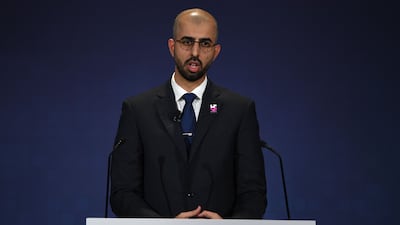In the Bletchley Declaration issued in the UK on Wednesday, 28 countries, including the UAE, endorsed proposals for tackling the potential catastrophic harms, either deliberate or unintentional, from the fast-developing AI industry.
The UK's Secretary of State for Science, Innovation and Technology Michelle Donelan said Britain's “historic leadership in overseeing the development of new technologies” would be entrenched by a follow-up meeting hosted by France.
The “Bletchley declaration on AI safety”, agreed by 28 countries, commits to a global approach to addressing the risks of AI and to “deepening our understanding of the emerging risks of frontier AI”, and will form a starting point for an ongoing dialogue.
The document committed countries to identify AI safety risks of shared concern and to work together to ensure safety to address those dangers. It said the process would commit developers and promoters of new systems at the frontiers of progress to transparently measure, monitor and mitigate the impact of their work.
"Actors developing frontier AI capabilities, in particular those AI systems which are unusually powerful and potentially harmful, have a particularly strong responsibility for ensuring the safety of these AI systems, including through systems for safety testing, through evaluations, and by other appropriate measures," the declaration said.
Alongside bias and privacy issues, the declaration identifies cybersecurity, biotechnology and misinformation risks as the main area of concern.
British Prime Minister Rishi Sunak said the declaration would kickstart a global process to make AI safe for all. “This is a landmark achievement that sees the world’s greatest AI powers agree on the urgency behind understanding the risks of AI – helping ensure the long-term future of our children and grandchildren," he said.
In a rare example of a meeting hosted by the West that included the US and China, the participants underlined the importance of staying engaged on the issue.
"We resolve to sustain an inclusive global dialogue that engages existing international fora and other relevant initiatives and contributes in an open manner to broader international discussions, and to continue research on frontier AI safety to ensure that the benefits of the technology can be harnessed," it said.
Alongside the host plus the US and China, countries endorsing the declaration include Brazil, France, India, Ireland, Japan, Kenya, the Kingdom of Saudi Arabia, Nigeria and the United Arab Emirates. South Korea will host the next global AI Safety Summit in six months' time and the third gathering will be hosted by France in a year's time.
During the Second World War, British codebreakers at Bletchley Park, including Alan Turing, used early forms of computer intelligence to break the Enigma code used by the Nazis to encrypt messages.
The discovery changed the course of the conflict, saving millions of lives.

Their work enabled British intelligence to act upon the information the Bletchley team gave them, contributing to several vital military victories during the war.
It also sparked the industrialisation of codebreaking and paved the way for the first forms of computers used today.
“What happened at Bletchley Park 80 years ago opened the door to the new information age,” Ms Donelan said before the summit.
“And what happens there this week will open the door to a new age of AI.”
Bletchley Park was confirmed as the location for the summit earlier this year because of the UK's history as “home to transformative technologies of the future”, Mr Sunak said.
He added there was “no better place” to host the first summit on global AI safety.
A permanent exhibition of the event will be placed at Bletchley after the two-day event, which the government hopes will produce an international statement about the nature of AI risks, offering the first globally agreed response to the technology.
Who is attending the event?
US Vice President Kamala Harris attended the summit through a series of engagements in London including meeting Mr Sunak.
The UAE, Canada, China, France, Germany, India, Ireland, Japan, Saudi Arabia, New Zealand, South Korea, Singapore, Spain, Ukraine and the US were among the attending governments.
Executives from tech companies Amazon, Google, Meta, Microsoft, Samsung and Sony attended, alongside AI businesses including ChatGPT-maker OpenAI and Google DeepMind.

Elon Musk, the SpaceX, Tesla and X owner, is to stream a conversation with Mr Sunak on Thursday night, after the summit's conclusion. "I think there's a lot of concern among people in the AI field that the government will sort of jump the gun on rules, before knowing what to do," he said before meeting Mr Sunak.
In a video address King Charles called AI one of the "greatest technological leaps in the history of human endeavour", praising the technology’s enormous potential to transform the lives of citizens around the world through better treatments for conditions such as cancer and heart disease.
The monarch also spoke of the "clear imperative to ensure that this rapidly evolving technology remains safe and secure".

















